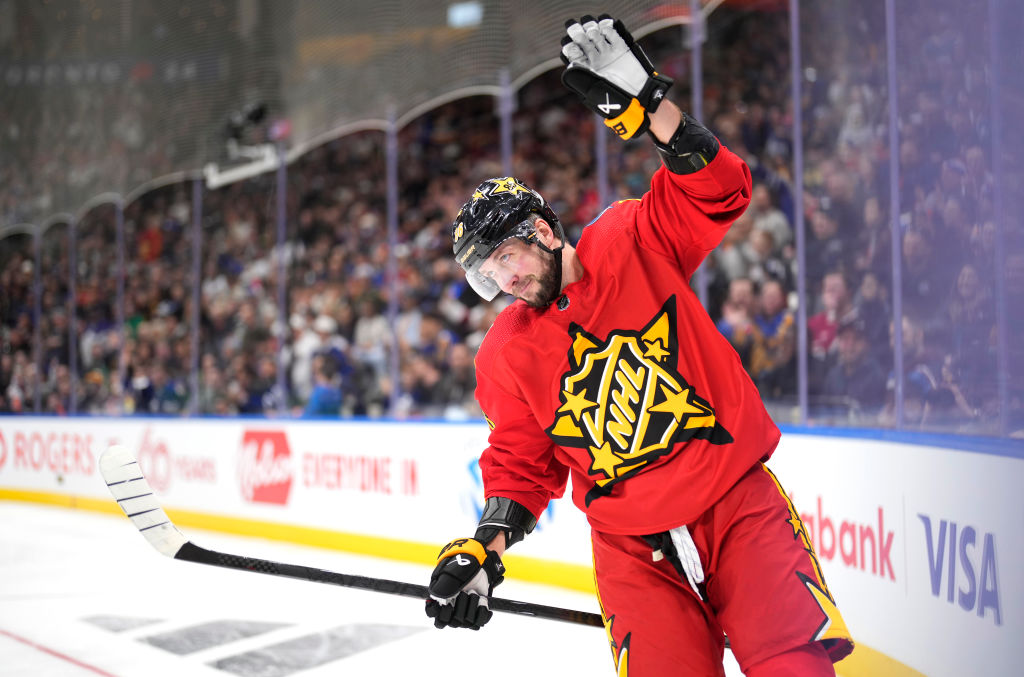This year's revamped NHL skills competition succeeded about as much as these things can, in large part because it climaxed with the league's best player owning an obstacle course (including an especially gut-wrenching section where you had to do lifted passes into tiny nets) faster than any of his so-called peers to lock up a prize of $1 million. You can't go wrong sending everyone home with memories of Connor McDavid at full capacity.
That McDavid earned the big prize is fitting, because he's the star credited with masterminding the new format centered around the novel concept of "let's just use guys who care about this sort of thing." Rather than dragging as many All-Stars as they could out of the bars and onto the ice for a series of stand-alone mini games, the NHL took 12 skaters who wanted to compete for the entire night and had them rack up continuous points in various events before the obstacle-course finale. The field, then, was conducive to teammates and buddies, including three Vancouver Canucks, but the odd man out seemed to be Tampa's Nikita Kucherov. As the league leader in points, Kucherov was an obvious choice for this night, but if he had an actual reason for wanting to be at the rink, he didn't show it. He did, however, find a purpose even as he finished in dead last—foil to the others, and enemy of the fans.
Kucherov and Toronto already aren't on friendly terms, since the Leafs and Lightning have each won a first-round series from the other over the last two years. But his skating on Friday didn't mend the relationship. Some skills events—like the accuracy shooting, where you have to hit four targets for it to end—demand some level of focus and attention from the player, lest they embarrass themselves with elongated failure. But the ones with a lot of skating are more open to interpretation, especially when there's a set limit on how long you can take. That was the passing challenge—one of the less-exciting events on Friday—which Kucherov just sleepwalked through, to the distaste of the crowd.
The boos showed up at the end for him here, but in the stickhandling competition, Toronto was ready from the start. When Kucherov lost the puck early and glumly trudged over to the boards to retrieve it, he activated the jeers.
Thankfully, this competition whittled down the field over the last few events, so Kucherov got to escape. But less than 24 hours later, he had to return for the All-Star Game itself, and the crowd was ready for him. Kucherov got paired against local hero Auston Matthews's side in the semifinals, and he produced a little more effort, but when he scored the game's first goal it didn't win him any new admirers. By the time that shootout arrived, Kucherov was egging the crowd on, and they got what they wanted when Igor Shesterkin made the save.
The Kucherov team went on to lose, but there were no hard feelings in the locker room afterward.
“I loved it,” he said. “I’m here to have fun and I’m sure the fans enjoyed it."
Remarked his one-off coach Rick Tocchet, “I said to ‘Kuch,’ ‘Everybody hates a winner, I guess.’"
All the major leagues annually fret about how to make their all-star weekends relevant to viewers and worthwhile to players. For the NHL this year, the game itself ended stronger than it started, but it also struggled you to keep you from letting your eyes glaze over during stretches of fairly listless play. The skills competition, on the other hand, actually clicked. Whether it's hockey or the slam dunk contest or the home run derby or whatever is happening in the NFL this weekend, these events aim to achieve a relaxed "kids messing around after practice is over" energy, but this structure was just focused enough to keep the activity from feeling pointless to outsiders.
What the NHL did right this year was give viewers recurring characters instead of random cameos. On Friday, players' nights had a beginning, middle, and end that gave people a reason to watch the whole way through. But if you're going to have characters, they need to have personality traits, which hockey guys generally aren't so good at. McDavid, as the best of the best and someone very motivated to win, made sense as a hero, but every hero requires a contrast to magnify his accomplishments, and that was Kucherov. He slacked off, showed apathy to the ticket-holders, and—crucially—didn't take it personally when they let him have it, instead embracing his role further. Even when he was tanking the level of play, he was making it better, because the only noise worse than a boo is no sound at all.





